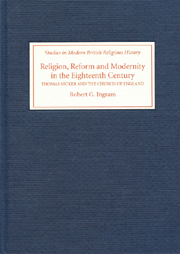Book contents
- Frontmatter
- Contents
- Dedication
- Preface
- Abbreviations
- 1 ‘Efforts at Amendment’
- 2 Becoming an Anglican
- 3 Becoming an Insider
- 4 The Church and the Enlightenment
- 5 The Church and the Parishioners
- 6 The Church and the State
- 7 The Church and America
- 8 The Church and Churches Abroad
- Epilogue
- Bibliography
- Index
- Previously published volumes in this series
5 - The Church and the Parishioners
Published online by Cambridge University Press: 12 September 2012
- Frontmatter
- Contents
- Dedication
- Preface
- Abbreviations
- 1 ‘Efforts at Amendment’
- 2 Becoming an Anglican
- 3 Becoming an Insider
- 4 The Church and the Enlightenment
- 5 The Church and the Parishioners
- 6 The Church and the State
- 7 The Church and America
- 8 The Church and Churches Abroad
- Epilogue
- Bibliography
- Index
- Previously published volumes in this series
Summary
Thomas Secker's thoughts on how to reform Anglican pastoral provision strongly echoed Gilbert Burnet's Discourse of the Pastoral Care (1692), a work written by the bishop of Salisbury in the aftermath of the Toleration Act. Thereafter, many churchmen fretted about how to deal with the confessional competition from Protestant nonconformists. Some advocated legal coercion of Dissenters and pressed for laws banning occasional conformity and regulating the Dissenting academies even more carefully. Others came at the problem from the other end, advocating religious comprehension to obviate the problem of religious nonconformity. Most, though, thought the Church could lure back confessional defectors and retain waverers without at the same time watering down its confessional requirements. Among the latter group, the latitudinarian Burnet argued forcefully that the burden lay with the clergy to convince Dissenters to return to the established Church. The problem, as Burnet saw it, was that churchmen had insufficiently fulfilled their pastoral responsibilities. ‘[T]he Pastoral Care, the Instructing, the Exhorting, the Admonishing and Reproving, the Directing and Conducting, the Visiting and Comforting the People of the Parish, is generally neglected,’ he groused. Church of England ministers, he argued, ‘are under more particular Obligations, first to look into our own Ways, and to reform whatsoever is amiss among us, and then to be Intercessors for the People committed to our Charge’.
- Type
- Chapter
- Information
- Religion, Reform and Modernity in the Eighteenth CenturyThomas Secker and the Church of England, pp. 114 - 156Publisher: Boydell & BrewerPrint publication year: 2007



